Listen to “The Great Detectives Present Sherlock Holmes” on Spreaker.
To write an introduction for Sherlock Holmes is a daunting task, it’s akin to writing an introduction to Shakespeare. The influence of Holmes is everywhere and in every culture on the globe. In the literature of Western Civilization, it’d be reasonable to state that Homes’ influence pales only in comparison to the Bible and Shakespeare. Holmes is quoted in productions as diverse as Star Trek VI and the Glenn Beck program.
The basic facts of Holmes are well-known to nearly every literate person on the globe. He was the creation of Sir Arthur Conan Doyle and made appearances in fifty-six short stories and four novels. He solved cases from 221B Baker Street in London with the assistance of his faithful companion, Dr. Watson. Holmes became so popular that Doyle couldn’t get away with killing him.
Holmes is one of the few true timeless characters in literature. His canonical adventures may have been set in the late 19th and early 20th centuries, but in the hands of a competent author, with a few modifications, Holmes could show up at a medieval castle or on a starship and still be a powerful character.
Every detective story that enjoyed any success in the past century, even if written as the antithesis of Holmes (such as Dashiell Hammett’s Sam Spade), owes something of its success to Doyle’s great detective for getting the public interested in the genre. Edgar Allan Poe’s C. Auguste Dupin may have been the first true detective in literature and an inspiration for Holmes, but even Dupin owes something to Holmes, as few people outside the academic world would care that Dupin existed without the wild success of Holmes.
Holmes has been recreated too many times to count, and each actor brings his own spin. The radio recreations of Holmes began October 20, 1930 when William Gillette, perhaps the great popularizer of Holmes, took the role to a new medium. It has continued off and on since them on a variety of networks including, NBC (1930-33) (1934-36) (1955), Blue Network (1939-42), Mutual Network (1943-46), (1947-49), ABC (1946-47) (1949-50) (1956), BBC (1954, and many more years.), BBC-WFMT Chicago (1959-69). Countless many others have featured Holmes, even after the official end of Old Time Radio in 1962. However, for the purpose of this series, we will focus exclusively on those renditions of Holmes believed to be in the public domain. Below is a profile of the actors to play Holmes in Old Time Radio. We will add new Holmes’ actors to our list as the podcast begins to share episodes featuring them.
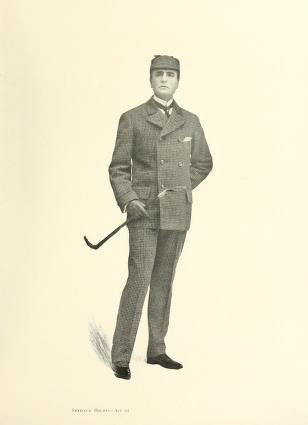
William Gillette (1853-1937): Gillette only made two radio appearances as Holmes. The first, the 1930 pilot for the Original Sherlock Holmes radio series, and in 1935 on Lux Radio Theater. However, Gillette may have done more than anyone other than perhaps Doyle himself to popularize Sherlock Holmes. Gillette was tasked with writing the first theater adaptation of Sherlock Holmes, and then he took Holmes on the road. Gillette would perform the role of Sherlock Holmes more than 1300 times in theaters in the United States, Great Britain, and Australia among other countries. Doyle created the greatest detective in literature, Gillette’s touches turned him into a character that would stand the test of time. Gillette gave Holmes the bent briar pipe, a magnifying glass, the violin, and the syringe. From his writings, rather than Doyle’s, springs the phrase, “Elementary, my dear Watson.” Gillette also portayed Holmes in a lost 1916 silent film. Orson Welles paid tribute to Gillette on an episode of Mercury Theater on the Air saying, “It is too little to say William Gillette resembled Sherlock Holmes. Sherlock Holmes looks exactly like William Gillette.”
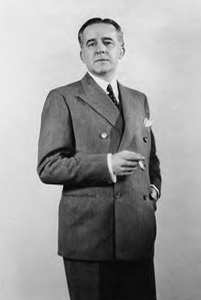
Richard Gordon (Unknown): I could find little about Gordon other than that he was a veteran stage actor who played Holmes on the stage and lived in Connecticut. Gordon played Holmes from 1930-33, with two episodes from his tenure suviving (Thanks to the Cobalt Club.)
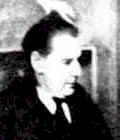
Louis Hector (1883-?): Louis Hector, often spelled Luis Hector, was the third radio voice of Sherlock Holmes and the first to portray him on television, appearing in a 1937 adaptation of The Three Garidebs. In the later Nigel Rathbone series, Hector would portray Moriarity. Hector was a Broadway veteran, playing his first role in a Broadway play in “Unwritten Chapter” and his last in “Inherit the Wind.” As with Gordon, biographical information is scarce. The date of his birth can be ascertained, but not the date of his death, leading me to wonder if there was more than fiction to his appearance on a “Tales of Tomorrow” episode where a doctor discovers a serum that would allow people to live forever.
 Orson Welles (1915-85) I’m not even going to attempt to write a fitting biography to Orson Welles in this space. Welles was a pioneering star of radio and film, beginning with his role of the Shadow at age 22. His numerous credits include “The Mercury Theater on the Air” and its famous “War of the World” special. He also hosted “The Black Museum” and starred in “The Lives of Harry Lime” which was based on the infamous character from the movie, “The Third Man” for Towers of London Productions, which was a worldwide syndicator of radio drama. Welles played Holmes in a Mercury Theater adaptation of a William Gillette play. For “Towers of London” he took on the role of Professor Moriarity in The Final Problem. Thus, he joined Louis Hector in having the distinction of playing both Holmes and his arch-nemesis.
Orson Welles (1915-85) I’m not even going to attempt to write a fitting biography to Orson Welles in this space. Welles was a pioneering star of radio and film, beginning with his role of the Shadow at age 22. His numerous credits include “The Mercury Theater on the Air” and its famous “War of the World” special. He also hosted “The Black Museum” and starred in “The Lives of Harry Lime” which was based on the infamous character from the movie, “The Third Man” for Towers of London Productions, which was a worldwide syndicator of radio drama. Welles played Holmes in a Mercury Theater adaptation of a William Gillette play. For “Towers of London” he took on the role of Professor Moriarity in The Final Problem. Thus, he joined Louis Hector in having the distinction of playing both Holmes and his arch-nemesis.
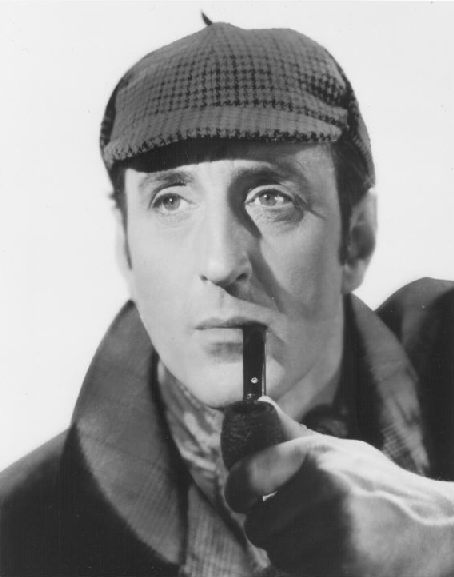 Basil Rathbone (1892-1967): More than 40 years after his death and more than 60 years after he last played Sherlock Holmes, Rathbone is viewed as the definitive Holmes by viewers around the world. However, Rathbone was more than just the movie face of Sherlock Holmes for 14 movies and his voice for more than 200 radio adventures, co-starring with his friend Nigel Bruce.
Basil Rathbone (1892-1967): More than 40 years after his death and more than 60 years after he last played Sherlock Holmes, Rathbone is viewed as the definitive Holmes by viewers around the world. However, Rathbone was more than just the movie face of Sherlock Holmes for 14 movies and his voice for more than 200 radio adventures, co-starring with his friend Nigel Bruce.
Rathbone was a talented actor in stage, screen, and radio, a two-time Academy Award Nominee and Tony Award Winner, a man with three seperate stars on the Hollywood Walk of Fame, and most importantly a decorated war hero. Much more is available on his remarkable career at basilrathbone.net.
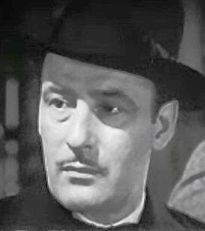 Tom Conway (1904-67): The Russia-born Conway was best known for replacing his brother, George Sanders and taking on the role of the Falcon on screen, as well as starring in two Bulldog Drummond movies. In addition to this, in the 1950s he starrred in the Mark Saber TV series. Conway is well-remembered as the narrator in Peter Pan. He also succeeded Simon Vincent Price in the Saint.
Tom Conway (1904-67): The Russia-born Conway was best known for replacing his brother, George Sanders and taking on the role of the Falcon on screen, as well as starring in two Bulldog Drummond movies. In addition to this, in the 1950s he starrred in the Mark Saber TV series. Conway is well-remembered as the narrator in Peter Pan. He also succeeded Simon Vincent Price in the Saint.
Taking over for Basil Rathbone in Sherlock Holmes was a daunting task. Conway’s Holmes was quite similar to Rathbone’s, albeit some listener’s see Conway’s portrayal as too sarcastic and caustic.
Conway’s life while successful in showbiz was marked by personal tragedy and alcoholism that led him to losing his wife and his brother cutting off contact with him in his later years.
John Stanley (?-?): Little is known of Stanley, other than that he was the child of two Americans born in England and grew up half a mile away from Baker Street. He came to America and began to work on radio in Rhode Island as a singer and later an announcer.
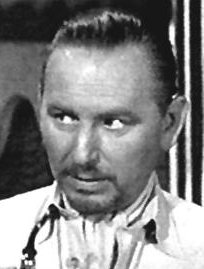 Ben Wright (1915-89) Wright’s career was marked by a couple starring roles. Perhaps, his most noteworthy was starring as Sherlock Holmes in the final season of the New Adventures of Sherlock Holmes. He also took on the role of Scotland Yard Inspector Peter Black in CBS’ Pursuit. However, he was known far better for his character roles. He was an indispensable man, particularly if the role called for a British accent. However, Wright could do quite a few dialects as evidenced by his 2 years playing the Chinese hotel clerk Hey-Boy on Have Gun Will Travel. Beyond recurring roles, he was used frequently on countless dramas. He made his first appearances on Yours Truly Dollar in 1949 and his last appearance eleven years later making him one of radio’s most indispensable people.
Ben Wright (1915-89) Wright’s career was marked by a couple starring roles. Perhaps, his most noteworthy was starring as Sherlock Holmes in the final season of the New Adventures of Sherlock Holmes. He also took on the role of Scotland Yard Inspector Peter Black in CBS’ Pursuit. However, he was known far better for his character roles. He was an indispensable man, particularly if the role called for a British accent. However, Wright could do quite a few dialects as evidenced by his 2 years playing the Chinese hotel clerk Hey-Boy on Have Gun Will Travel. Beyond recurring roles, he was used frequently on countless dramas. He made his first appearances on Yours Truly Dollar in 1949 and his last appearance eleven years later making him one of radio’s most indispensable people.
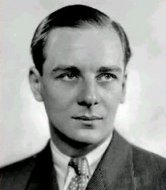 Sir John Gielgud (1904-2000): Gielgud was a famous actor and director known for his Shakespearean performances as well as his association with Sherlock Holmes co-star Ralph Richardson. Gielgud is one of only eleven people to have won an Emmy (1991), a Grammy (1979), an Oscar (1981), and a Tony (1961). His first film appearance was in 1924 and his last was in 2000.
Sir John Gielgud (1904-2000): Gielgud was a famous actor and director known for his Shakespearean performances as well as his association with Sherlock Holmes co-star Ralph Richardson. Gielgud is one of only eleven people to have won an Emmy (1991), a Grammy (1979), an Oscar (1981), and a Tony (1961). His first film appearance was in 1924 and his last was in 2000.
Sherlock Holmes Episodes
Richard Gordon:
- The Final Problem* (Original Air Date: May 12, 1932)
- Death at Stonehenge *(Original Air Date: March 15, 1933)
Louis Hector:
- The Hebraic Breastplate (Original Air Date: November 11, 1934.)
- Adventure of the Devil’s Foot (Original Air Date: May 30, 1936.)
- The Armchair Solution (Original Air Date: June 6, 1936.)
Orson Welles:
- The Immortal Sherlock Holmes (Original Air Date: September 25, 1938)
Basil Rathbone:
- The Bruce Partington Plans (Original Air Date: November 6, 1939)
- The Retired Colourman (Original Air Date: March 25, 1940)
- The Copper Beeches (Original Air Date: October 6, 1940)
- Mrs. Warren’s Key (Original Air Date: December 7, 1941)
- The Missing Bloodstains (Original Air Date: May 15, 1944)
- The Superflous Pearl (Original Air Date: May 22, 1944)
- Book of Tobit (Original Air Date: March 26, 1945)
- The Amateur Mendicant Society (Original Air Date: April 2, 1945)
- The Vienese Strangler (Original Air Date: April 9, 1945)
- The Notorious Canary Trainer (Original Air Date: April 23, 1945)
- The Unfortunate Tobacconist (Original Air Date: April 30, 1945)
- The Purloined Ruby (Original Air Date: May 7, 1945)
- In Flanders Field (Original Air Date: May 14, 1945)
- The Paradol Chamber (Original Air Date: May 21, 1945)
- The Limping Ghost (Original Air Date: September 3, 1945)
- Colonel Warburton’s Madness (Original Air Date: September 10, 1945)
- The Out of Date Murder (Original Air Date: September 17, 1945)
- The Eyes of Mr. Leyton (Original Air Date: September 24, 1945)
- The Problem of Thor Bridge (Original Air Date: October 1, 1945)
- the Vanishing Elephant (Original Air Date: October 8, 1945)
- The Manor House Case (Original Air Date: October 15, 1945)
- The Great Gandolfo (Original Air Date: October 22, 1945)
- Murder in the Moonlight (Original Air Date: October 29, 1945)
- The Fifth of November (Original Air Date: November 5, 1945)
- The Speckled Band (Original Air Date: November 12, 1945)
- The Double Zero (Original Air Date: November 19, 1945)
- The Accidental Murderess (Original Air Date: November 26, 1945)
- Murder in the Casbah (Original Air Date: December 3, 1945)
- A Scandal in Bohemia (Original Air Date: December 10, 1945)
- The Second Generation (Original Air Date: December 17, 1945)
- The Case of the Iron Box (Original Air Date: December 31, 1945)
- The Strange Case of the Murderer in Wax (Original Air Date: January 7, 1946)
- Murder Beyond the Mountains (Original Air Date: January 14, 1946)
- The Telltale Pigeon Feathers (Original Air Date: January 21, 1946)
- The Strange Case of the Demon Barber (Original Air Date: January 28, 1946)
- The Indiscretion of Mr. Edwards (Original Air Date: February 4, 1946)
- The Guileless Gypsy (Original Air Date: February 11, 1946)
- Camberwell Poisoning (Original Air Date: February 18, 1946)
- The Terrifying Cats (Original Air Date: February 25, 1946)
- The Submarine Caves (Original Air Date: March 4, 1946)
- The Living Doll (Original Air Date: March 11, 1946)
- The Adventure of the Blarney Stone (Original Air Date: March 18, 1946)
- The Girl with the Gazelle (Original Air Date: March 25, 1946)
- The April Fools Adventure (Original Air Date: April 1, 1946)
- The Disappearing Scientists (Original Air Date: April 8, 1946)
- The Headless Monk (Original Air Date: April 15, 1946)
- The Tankerville Club Scandal (Original Air Date: April 22, 1946)
- The Waltz of Death (Original Air Date: April 29, 1946)
- The Man with the Twisted Lip (Original Air Date: May 6, 1946)
- The Adventure of the Uneasy Chair (Original Air Date: May 13, 1946)
- The Haunting of Sherlock Holmes (Original Air Date: May 20, 1946)
- The Baconian Cipher (Original Air Date: May 27, 1946)
Tom Conway Episodes:
- The Adventure of the Stuttering Ghost (Original Air Date: October 12, 1946)
- The Adventure of the Black Angus (Original Air Date: October 19, 1946)
- The Clue of the Hungry Cat (Original Air Date: October 26, 1946)
- The Adventure of the Original Hamlet (Original Air Date: November 2, 1946)
- The Singular Affair of the Dying Schoolboys (Original Air Date: November 9, 1946)
- The Adventure of the Genuine Gunarius (Original Air Date: November 16, 1946)
- The Adventure of the Sally Martin (Original Air Date: November 23, 1946)
- The Strange Death of Mrs. Abernathy (Original Air Date: November 30, 1946)
- The Singular Affair of the Coptic Compass (Original Air Date: December 7, 1946)
- The Adventure of the Elusive Emerald (Original Air Date: December 14, 1946)
- The Adventure of the Grand Old Man (Original Air Date: December 21, 1946)
- The Singular Affair of the White Cockerel (Original Air Date: December 28, 1946)
- The Darlington Substitution Case (Original Air Date: January 4, 1947)
- The Adventure of the Devil’s Foot (Original Air Date: January 13, 1947)
- The Singular Affair of the Babbling Butler (Original Air Date: January 27, 1947)
- The Adventure of the Dying Detective (Original Air Date: February 3, 1947)
- The Strange Case of the Persecuted Millionaire (Original Air Date: February 10, 1947)
- The Adventure of the Haunted Bagpipes (Original Air Date: February 17, 1947)
- The Horseless Carriage (Original Air Date: February 24, 1947)
- Queue for Murder (Original Air Date: March 3, 1947)
- The Singular Affair of the Egyptian Curse (Original Air Date: March 10, 1947) (Ben Wright filling in.)
- The Adventure of the Creeping Man (Original Air Date: March 17, 1947)
- The Adventure of the Scarlet Worm (Original Air Date: March 24, 1947)
- The Adventure of Maltree Abbey (Original Air Date: March 31, 1947)
- The Adventure of the Tolling Bell (Original Air Date: April 7, 1947)
- The Adventure of the Carpathian Horror (Original Air Date: April 14, 1947)
- The Adventure of the Lion’s Mane (Original Air Date: April 21, 1947)
- The Island of Death (Original Air Date: April 28, 1947)
- The Remarkable Affair of the Pointless Robbery (Original Air Date: May 5, 1947)
- The Adventure of Wisteria Lodge (Original Air Date: May 12, 1947)
- The Case of the Harley Street Murders (Original Air Date: May 19, 1947)
- The Adventure of the Submerged Baronet (Original Air Date: May 26, 1947)
- The Red Headed League (Original Air Date: June 2, 1947)
- Murder in the Locked Room (Original Air Date: June 9, 1947)
- Death in the North Sea (Original Air Date: June 16, 1947)
- Adventure of the Speckled Band (Original Air Date: June 23, 1947)
- The Adventure of the Innocent Murderess (Original Air Date: June 30, 1947)
- The Adventure of the Iron Maiden (Original Air Date: July 7, 1947)
John Stanley Episodes:
- The Dog Who Changed His Mind (Original Air Date: September 28, 1947)
- The Case of the Missing Heiress (Original Air Date: October 5, 1947)
- The Adventure of the Red Headed League (Original Air Date: October 12, 1947)
- The Affair of the Politician, the Lighthouse, and the Trained Cormorant (Original Air Date: October 19, 1947)
- The Laughing Lemur of High Tower Heath (Original Air Date: October 26, 1947)
- The Adventure of the Copper Beeches (Original Air Date: November 2, 1947)
- The Cadaver in the Roman Toga (Original Air Date: November 9, 1947)
- The Case of the Well-Staged Murder (Original Air Date: November 16, 1947)
- The Stolen Naval Treaty (Original Air Date: November 23, 1947)
- The Case of the Cradle that Rocked Itself (Original Air Date: November 30, 1947)
- The Case of Professor Moriarty and the Diamond Jubilee (Original Air Date: December 7, 1947)
- The Sussex Vampire (Original Air Date: December 14, 1947)
- The Mazarin Stone (Original Air Date: January 4, 1948)
- The Case of Sudden Senility (Original Air Date: January 11, 1948)
- The Case of the Lucky Shilling (Original Air Date: January 18, 1948)
- The Case of the Engineer’s Thumb (Original Air Date: January 25, 1948)
- The Cast of the Avenging Blade (Original Air Date: February 1, 1948)
- The Case of the Sanguinary Spectre (Original Air Date: February 8, 1948)
- The Case of Shoscombe Old Place (Original Air Date: February 15, 1948)
- The Adventure of the Wooden Claw (Original Air Date: February 22, 1948)
- The Case of King Philip’s Golden Salver (Original Air Date: February 29, 1948)
- The Adventure of the Six Napoleons (Original Air Date: March 7, 1948)
- The Adventure of the Serpent God (Original Air Date: March 14, 1948)
- Death is a Golden Arrow (Original Air Date: March 21, 1948)
- The Disappearance of Lady Frances Carfax (Original Air Date: March 28, 1948)
- Lady Waverly’s Imitation Pearls (Original Air Date: April 4, 1948)
- The Empty House (Original Air Date: April 11, 1948)
- The Case of the Very Best Butter (Original Air Date: April 18, 1948)
- The Return of the Jack of Diamonds *(Original Air Date: April 25, 1948)
- The Sinister Crate of Cabbages (Original Air Date: May 2, 1948)
- The Case of the Illustrious Client (Original Air Date: May 9, 1948)
- The Ever-blooming Roses (Original Air Date: May 16, 1948)
- The Case of the Accommodating Valise (Original Air Date: May 23, 1948)
- A Case of Identity (Original Air Date: May 30,1948)
- The Complicated Poisoning at Eel Pie Island (Original Air Date: June 6, 1948)
- The Bleeding Chandelier (Original Air Date: June 13, 1948)
- Adventure of the Veiled Lodger (Original Air Date: June 20, 1948)
- The Unwelcome Ambassador(Original Air Date: September 12, 1948)
- The Black Guardsman of Braddock Castle (Original Air Date: September 19, 1948)
- The Bruce Partington Plans (Original Air Date: September 26, 1948)
- The Frightened Bookkeeper (Original Air Date: October 3, 1948)
- The Adventure of the Guy Fawkes Society (Original Air Date: October 10, 1948)
- The Adventure of Black Peter (Original Air Date: October 17,1948)
- The Fabulous Windmill (Original Air Date: October 24, 1948)
- The Uddington Witch (Original Air Date: October 31, 1948)
- The Logic of Murder (Original Air Date: November 7, 1948)
- The Ancient Queen (Original Air Date: November 14, 1948)
- The Adventure of the Discordant Bells (Original Air Date: November 21, 1948)
- The Case of the Well-Advertised Murder (Original Air Date: November 28, 1948)
- The Island of the Dead (Original Air Date: December 5, 1948)
- The Adventure of London Tower (Original Air Date: December 12, 1948)
- The Adventure of the Speckled Band (Original Air Date: December 19, 1948)
- The Malicious Moor (Original Air Date: January 3, 1949)
- The Knife of Vengence (Original Air Date: January 10, 1949)
- The Fabulous Celebrities (Original Air Date: January 17, 1949)
- The Bloomsbury Ballad (Original Air Date: January 24, 1949)
- The Devil’s Foot (Original Air Date: January 31, 1949)
- The Blood Stained Goddess (Original Air Date: February 7, 1949)
- The Guest in the Coffin (Original Air Date: February 14, 1949)
- Adventure of the Hangman and the Book (Original Air Date: February 21, 1949)
- The Adventure of the East End Strangler (Original Air Date: February 28, 1949)
- Murder on a Wager (Original Air Date: March 7, 1949)
- The Adventure of the Unfortunate Valet (Original Air Date: March 14, 1949)
- The Elusive Agent, Part One (Original Air Date: March 21, 1949)
- The Elusive Agent, Part Two (Original Air Date: March 28, 1949)
- The Elusive Agent, Part Three (Original Air Date: April 4, 1949)
- Mad Miners of Cardiff (Original Air Date: April 11, 1949)
- The Burmese Goddess (Original Air Date: April 18, 1949)
- The Adventure of the Golden Pince-Nez (Original Air Date: April 25, 1949)
- The Blood-Soaked Wagon (Original Air Date: May 2, 1949)
- The Adventure of the Three Garridebs (Original Air Date: May 9, 1949)
- The Adventure of the Gray Pasha (Original Air Date: May 16, 1949)
- Dr. Winthrop’s Notorious Carriage (Original Air Date: May 23, 1949)
- The Adventure of the Curious Crypt (Original Air Date: May 30, 1949)
- The Adventure of the Red Death (Original Air Date: June 6, 1949)
Ben Wright:
- The Duke of Hollywell (Original Air Date: March 22, 1950)
John Gielgud:
- Doctor Watson Meets Sherlock Holmes (Original Air Date: January 2, 1955)
- A Scandal in Bohemia (Original Air Date: January 9, 1955)
- The Case of the Red Headed League (Original Air Date: January 16, 1955)
- The Tragedy of the Gaslighter’s Ball (Original Air Date: January 23, 1955)
- The Second Stain (Original Air Date: January 30, 1955)
- The Bruce Partington Plans (Original Air Date: February 6, 1955)
- The Dying Detective (Original Air Date: February 13, 1955)
- The Norwood Builder (Original Air Date: February 20, 1955)
- The Solitary Cyclist (Original Air Date: February 27, 1955)
- The Six Napoleons (Original Air Date: March 6, 1955)
- The Blue Carbuncle (Original Air Date: March 13, 1955)
- The Speckled Band (Original Air Date: March 20, 1955)
- The Silver Blaze (Original Air Date: March 27, 1955)
- The Golden Pince-Nez (Original Air Date: April 3, 1955)
- The Final Problem (Original Air Date: April 10, 1955)
- The Empty House (Original Air Date: April 17, 1955)
Christmas and New Years Episodes (Played Out of Order):
- The Night Before Christmas (Original Air Date: December 24, 1945)
- The Adventure of the Christmas Bride(Original Air Date: December 21, 1947)
- New Year’s Eve Off the Scilly Isles (Original Air Date: December 28, 1947)
- The Adventure of the Blue Carbuncle (Original Air Date: December 26, 1948)
Video Theater Episodes:
- Sherlock Holmes and the Secret Weapon (Rathbone-Bruce)
- The Woman in Green (Rathbone-Bruce)
- Terror by Night (Rathbone-Bruce)
- Dressed to Kill (Rathbone-Bruce)
- Sherlock Holmes: The Cunningham Heritage (Ronald Howard)
- Sherlock Holmes: The Christmas Pudding (Ronald Howard)
- Sherlock Holmes: The Case of the Lady Beryl (Ronald Howard)
- Sherlock Holmes: The Case of the Pennsylvania Gun (Ronald Howard)
- Sherlock Holmes: The Case of the Texas Cowgirl (Ronald Howard)
- Sherlock Holmes: The Case of the Belligerent Ghost (Ronald Howard)
Log information from OTRSite
*Episode Played Out of Order

Dear Adam, I have this same copy of the “The Noble Bachelor” but my copy contains additional dialogue at the end, in which the actor playing Dr. Watson says, “In real life my name is Norman Shelley, my friend Carlton Hobbes played Sherlock Holmes.” The same recording is at the end of my copy of “The House of Three Gables. I have listened to both recordings side by side on my ipod and they are identical with your recordings, except for the fact that your recording does not have the additional actor identification at the end. I think, therefore that this might clarify some of the discrepancy in voice recognition you have expressed. These recordings are from the BBC recording that was broadcast from Chicago, and later sponsored by Berkley’s bank. I know that you will want this information, even though it means possible extra work for you!
Can you tell me who wrote “The Missing Bloodstains”? Was it Doyle or was it Green and Boucher? If it was not Doyle, was it based on a Doyle story?
Thanks
#Just to express a huge appreciation for the special hour long Mercury Theatre production of the Sherlock Holmes podcast featuring Orson Welles. What a tour de force! Adam’s mine of information (fore and aft) add to the knowledge and enjoyment tremendously. Agree that this was like a play – and what an impeccable accent? We truly did lose a man of towering characterisation abilities to the star system. Am truly indebted to learn the importance of American actor, William Gillette, who first brought Holmes to the stage (with ACD’s permission). Astounded to discover Gillette formulated the phrase, “Oh this is elementary, my dear fellow”. As a Brit, great to know too, that as an American, he powerfully created the prototype Holmes on stage and for radio, which have been faithfully followed by a vast array of successive Holmes in similar mold.
Adam – I love your podcasts! Thanks so much! I have been listening to otr and in particular, Sherlock Holmes and Hercule Poirot stories on tape most of my life. That is how my parents would put my brother and me to sleep when we were young. It is a habit that we have both carried through to adulthood. I am currently studying in Israel and since tapes aren’t common anymore, I was searching for something to put on my iPod to listen to when I fall asleep. Thanks for the really informative commentary and podcasts.
I used to be Sherlock Holmes/Agatha Christie purist but I have started listening to Let George Do It, The Shadow and Thin Man. Anyway you could find some of the old Agatha Christies?
I blogged about you on my site too – http://taliashewrote.com
Thanks for doing this!
Hi Adam, love your show, especially the Holmes, Let George Do It, and Nero Wolfe episodes. As I’m listening weekly, I’m also reading through Sir Arthur Conan Doyle’s stories and I discovered that the last line of “The Darlington Substitution Case” was taken verbatim from “A Case of Identity.” I appreciate that as the writers create their own stories similar to Doyle’s, they wisely borrow directly from Doyle himself. Thanks for all the time and effort you put into bringing these classic broadcasts back to life!
I started listening to your show from the beginning and was a little put out. After all I have downloaded a lot of these shows myself and listened to them. Why did I need someone else to do it for me? Because I’m discovering new shows to listen to as well as info about the actors and episodes. I don’t think I’ll ever find a show that I like better than the Basil Rathbone Sherlock Holmes Episodes but I’ll be listening to find out.
Hi jus tuned in first time i’ve been listening to otr sherlock holmes since i was a kid (I’m 26) i’ve never heard alot of these stanley and and conway has always been my favorites but thank you so much for giving me a chance to hear them. It was something me and my grandma used to listen to on my visits we used to curl up in front of a fire and listen thank you so much for giving me a chance to not only relive these found memories but make new ones with my own kids ( when theyre old enough to appreciate them lol) You brought a smile to my face good sir. = )
Great collection. Thank you.
The mp3 files do not appear for GD0524 The Cadaver in the Roman Toga, GD0534 The Stolen Naval Treaty, GD0544 Case of Professor Moriarty and the Diamond Jubilee, GD0554 The Mazarin Stone, GD0559 The Case of Sudden Senility, and GD0574 The Case of the Lucky Shilling. Please tell me how I may download these six shows.
Thank you.
Peter Currall
Dear Sir — I have been listening to a lot of Sherlock Holmes radio shows at dumb.com. When I got to the 1954-55 series of broadcasts, I was intrigued by the music that Holmes plays on his violin. I found a reference to the violinist as possibly being Alfredo Campoli, but what I want to know is the title of the music (Paganini? Mozart? Vivaldi? etc?). I would appreciate any help I can glean regarding my search. Jack Waters in Sacramento, CA, USA
http://otrarchive.blogspot.com/2009/04/sherlock-holmes.html Murder at the Opera a Rathbone episode is not included on your list
I just wanted to say that I love the updates to the website! I’ve been coming here for several months to listen to all the Sherlock Holmes stories you have, and I really like the change you’ve made. Thanks for making all these shows available to us!!
I came upon this site through TuneIn which I came upon by chance. These are now bookmarked. Monetary support will be forthcoming.